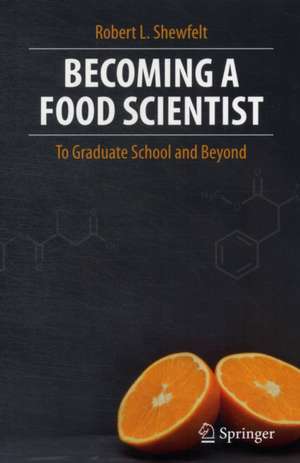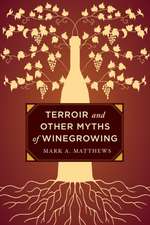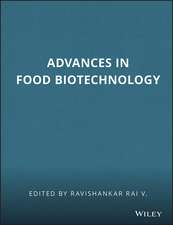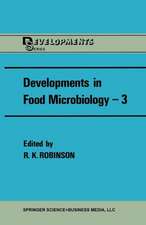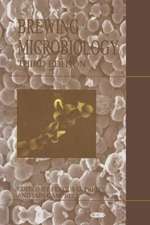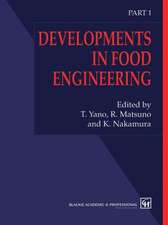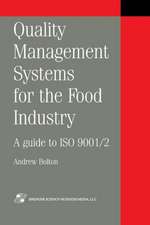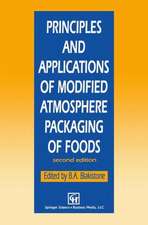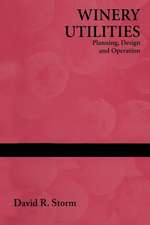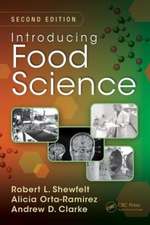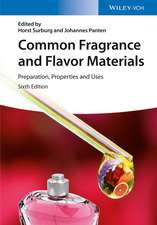Becoming a Food Scientist: To Graduate School and Beyond
Autor Robert L. Shewfelten Limba Engleză Paperback – 19 apr 2012
The book introduces the concept of research as process in the first chapter. Subsequent chapters focus on individual unit operations of research: idea generation, problem definition, critical evaluation of the literature, method selection, experimental design, data collection, processing and analysis, and knowledge dissemination. Successful graduate students in food science must master each of these operations. The final section of the book pushes the reader beyond graduate school into its practice in the real world. Topics covered in the maturation of a food scientist include the scientific meeting, critical thinking, science and philosophy, ethics, finding and managing the literature, planning, grantsmanship, laboratory setup and management, and career development. This book should be a meaningful companion for any graduate student in the field and those transitioning from graduate school to the food science profession.
Preț: 130.90 lei
Nou
Puncte Express: 196
Preț estimativ în valută:
25.05€ • 25.99$ • 20.94£
25.05€ • 25.99$ • 20.94£
Carte disponibilă
Livrare economică 22 februarie-08 martie
Preluare comenzi: 021 569.72.76
Specificații
ISBN-13: 9781461432982
ISBN-10: 1461432987
Pagini: 125
Ilustrații: XI, 168 p. 49 illus., 22 illus. in color.
Dimensiuni: 155 x 235 x 18 mm
Greutate: 0.27 kg
Ediția:2012
Editura: Springer Us
Colecția Springer
Locul publicării:New York, NY, United States
ISBN-10: 1461432987
Pagini: 125
Ilustrații: XI, 168 p. 49 illus., 22 illus. in color.
Dimensiuni: 155 x 235 x 18 mm
Greutate: 0.27 kg
Ediția:2012
Editura: Springer Us
Colecția Springer
Locul publicării:New York, NY, United States
Public țintă
Upper undergraduateCuprins
1. Research as Process.- I. Unit Operations of Research.- 2. Idea Generation.- 3. Problem Definition.- 4. Critical Evaluation of Literature.- 5. Method Selection.- 6. Experimental Design.- 7. Data Collection.- 8. Processing and Analysis.- 9. Knowledge Dissemination.- II. Maturation of a Scientist.- 10. The Scientific Meeting.- 11. Critical Thinking.- 12. Science and Philosophy.- 13. Ethics in Science.- 14. Finding and Organizing Scientific Resources.- 15. Planning.- 16. Grantsmanship.- 17. Laboratory Setup and Management.- 18. Career Development.
Recenzii
From the reviews:
“The book would also be useful in informing non-scientists about what scientists do and how they do it. … every chapter contains some very practical advice as well as a brief more intellectual discussion of the topic. Each chapter contains charts, diagrams, or photographs and reference citations. … The color photographs are of excellent quality … . The chapters are mostly self-contained so the book could easily be used as a resource for a seminar for students beginning or about to begin research.” (Grady Chism, Journal of Food Science Education, Vol. 11, 2012)
“The book would also be useful in informing non-scientists about what scientists do and how they do it. … every chapter contains some very practical advice as well as a brief more intellectual discussion of the topic. Each chapter contains charts, diagrams, or photographs and reference citations. … The color photographs are of excellent quality … . The chapters are mostly self-contained so the book could easily be used as a resource for a seminar for students beginning or about to begin research.” (Grady Chism, Journal of Food Science Education, Vol. 11, 2012)
Notă biografică
Dr. Robert L. Shewfelt is the Josiah Meigs Distinguished Teaching Professor of Food Science and Technology at the University of Georgia. Known for his unique teaching style and extensive collection of food-themed shirts, he has carefully studied the life cycle of a graduate student in food science and offers these tips for a more meaningful experience in graduate school and beyond.
Textul de pe ultima copertă
Becoming a Food Scientist is designed as a reservoir of ideas for those beginning a graduate education in food science or beginning a professional career in the field. Although at times it may read as a how-to manual for success in graduate school, it is meant to encourage each reader to study the research process, to challenge conventional wisdom, and to develop a career path that maximizes the probability of success both in school and beyond. The author has viewed food science graduate programs through the lenses of programs at four universities and service in numerous activities with the Institute of Food Technologists. This book is thus focused on the field of food science, but it may have relevance to other scientific disciplines.
The book introduces the concept of research as process in the first chapter. Subsequent chapters focus on individual unit operations of research: idea generation, problem definition, critical evaluation of the literature, method selection, experimental design, data collection, processing and analysis, and knowledge dissemination. Successful graduate students in food science must master each of these operations. The final section of the book pushes the reader beyond graduate school into its practice in the real world. Topics covered in the maturation of a food scientist include the scientific meeting, critical thinking, science and philosophy, ethics, finding and managing the literature, planning, grantsmanship, laboratory setup and management, and career development. This book should be a meaningful companion for any graduate student in the field and those transitioning from graduate school to the food science profession.
The book introduces the concept of research as process in the first chapter. Subsequent chapters focus on individual unit operations of research: idea generation, problem definition, critical evaluation of the literature, method selection, experimental design, data collection, processing and analysis, and knowledge dissemination. Successful graduate students in food science must master each of these operations. The final section of the book pushes the reader beyond graduate school into its practice in the real world. Topics covered in the maturation of a food scientist include the scientific meeting, critical thinking, science and philosophy, ethics, finding and managing the literature, planning, grantsmanship, laboratory setup and management, and career development. This book should be a meaningful companion for any graduate student in the field and those transitioning from graduate school to the food science profession.
Caracteristici
Helps students to develop a more thoughtful approach to graduate research
Provides insight into the research process
Contains anecdotes and examples of the graduate experience
Includes supplementary material: sn.pub/extras
Provides insight into the research process
Contains anecdotes and examples of the graduate experience
Includes supplementary material: sn.pub/extras
